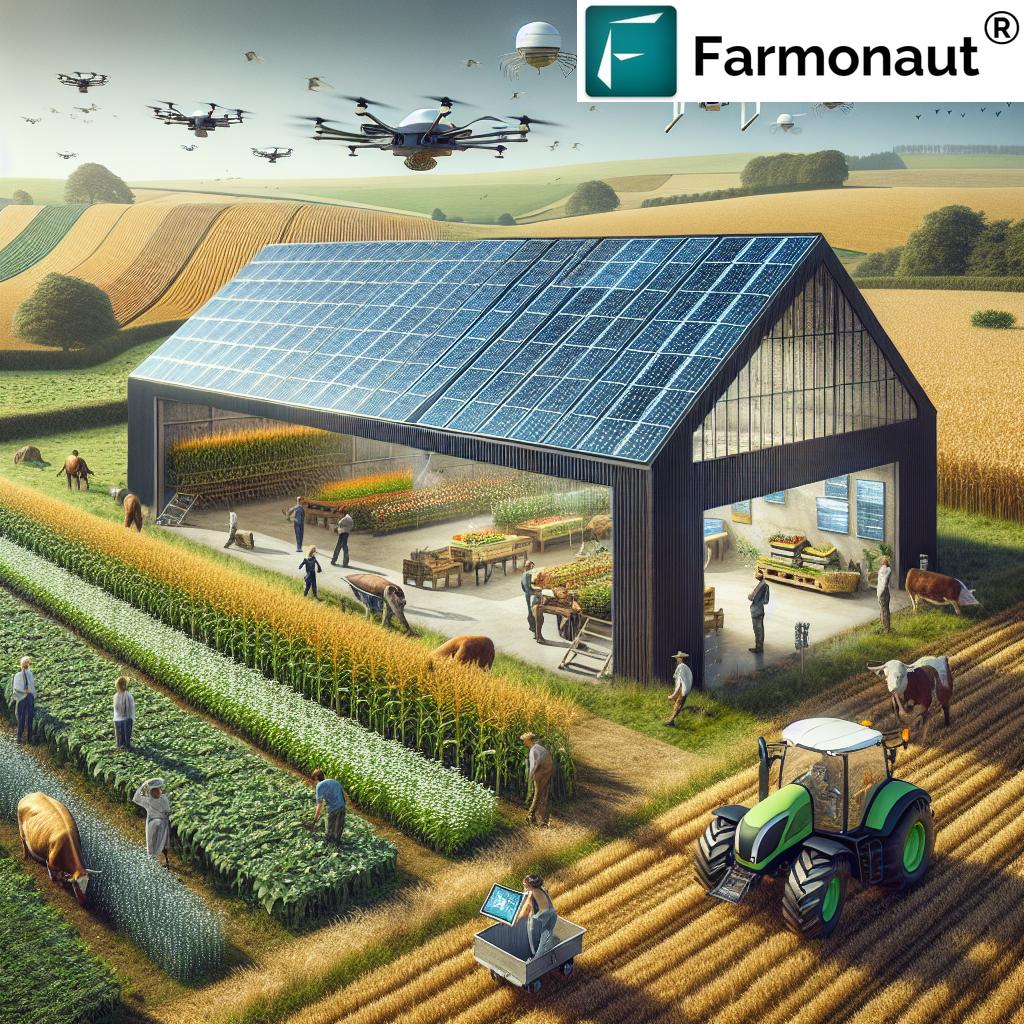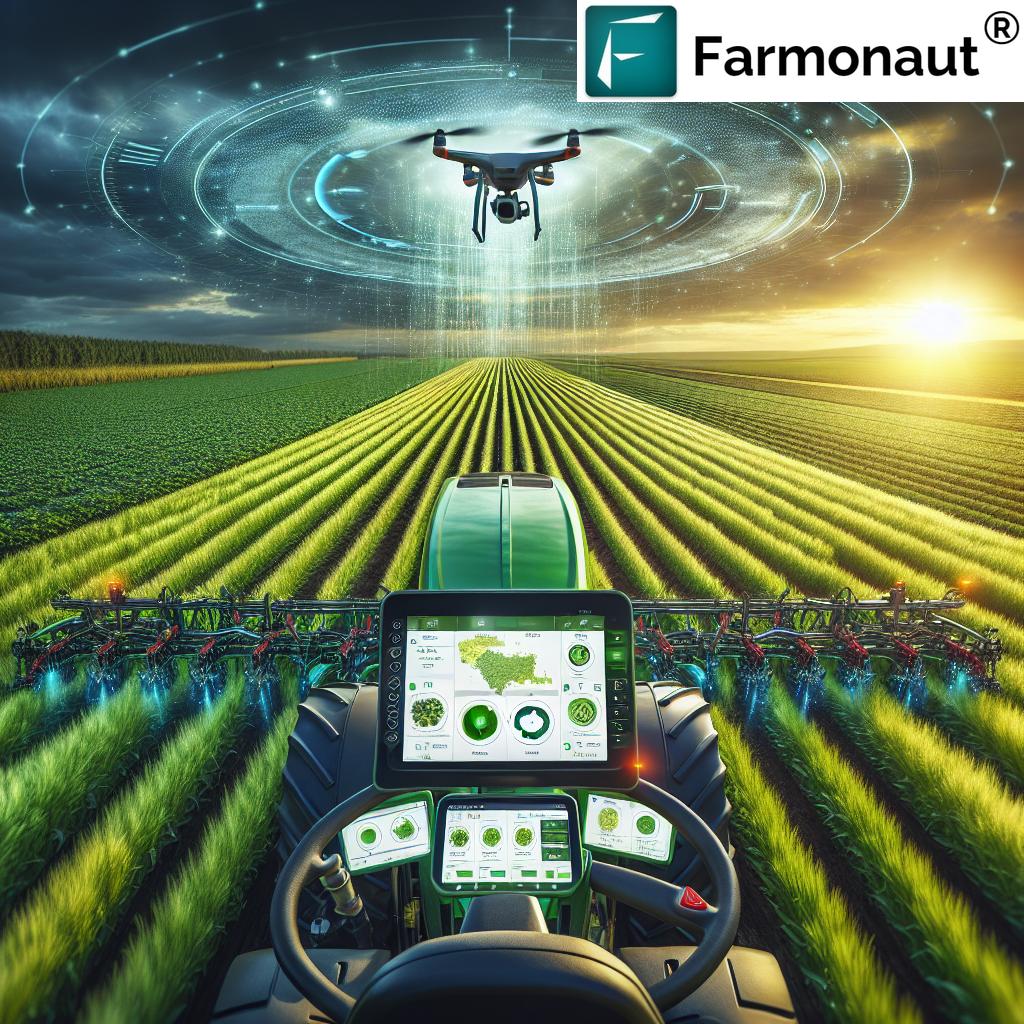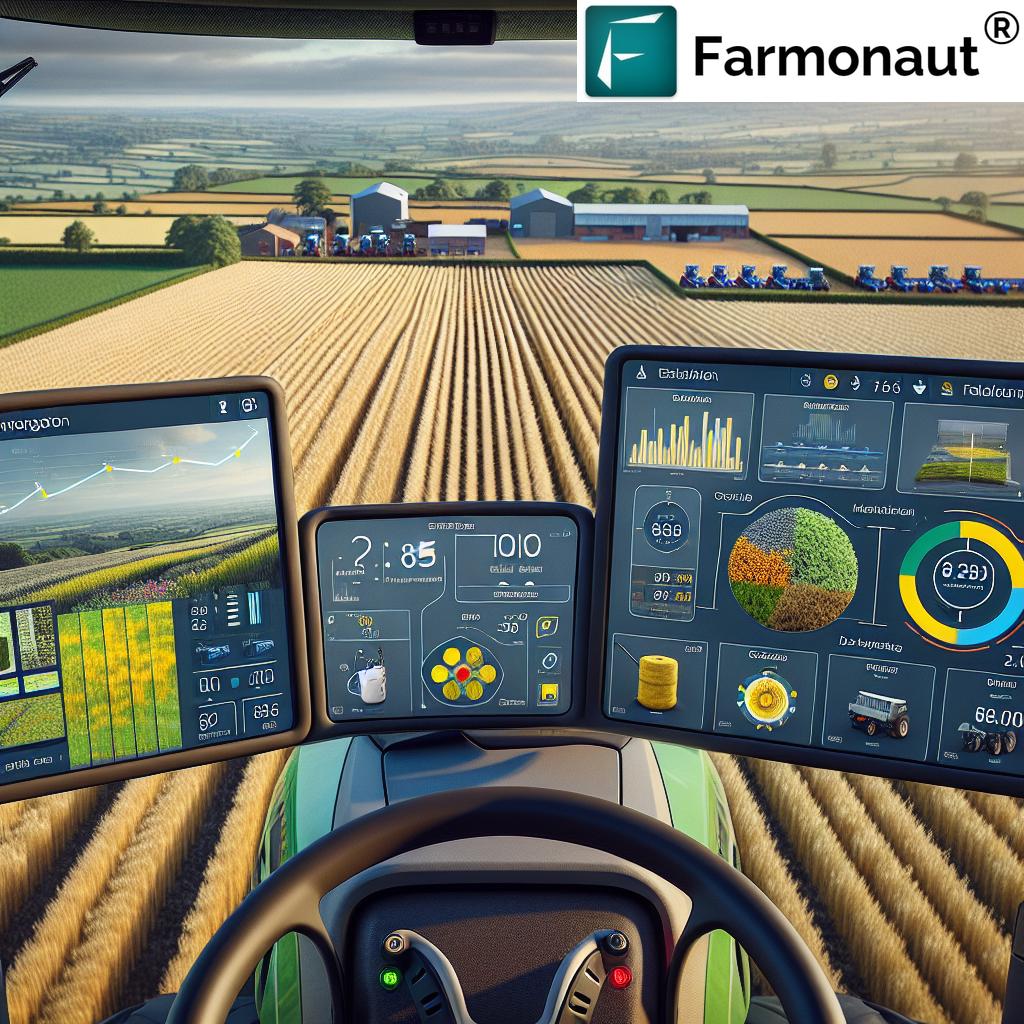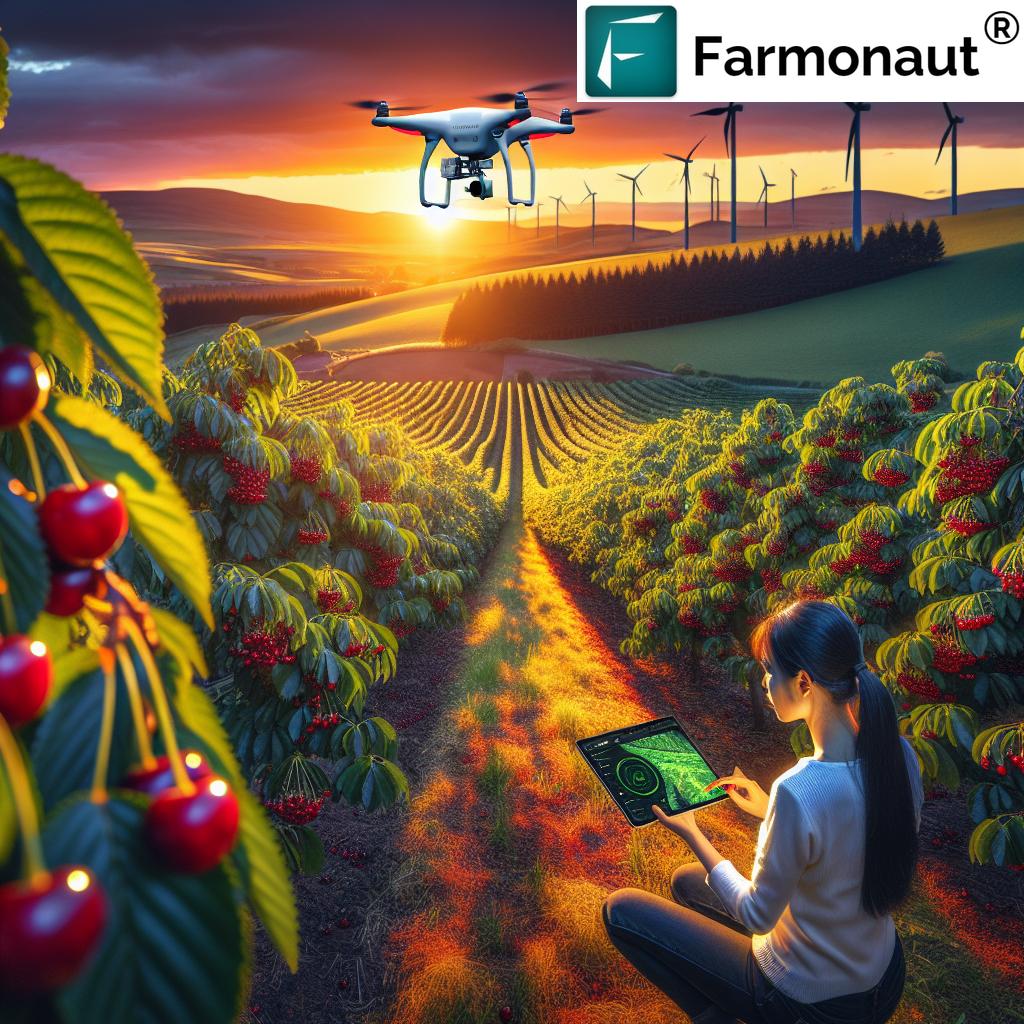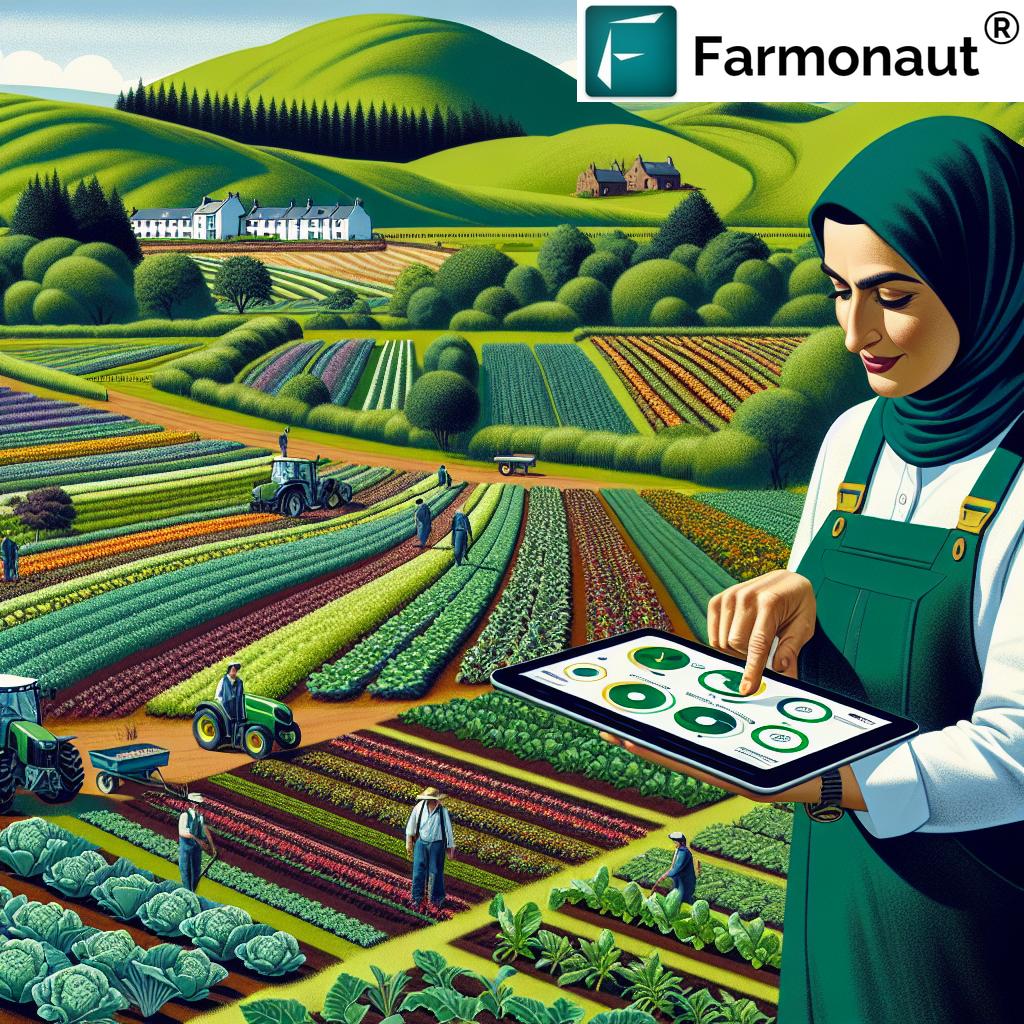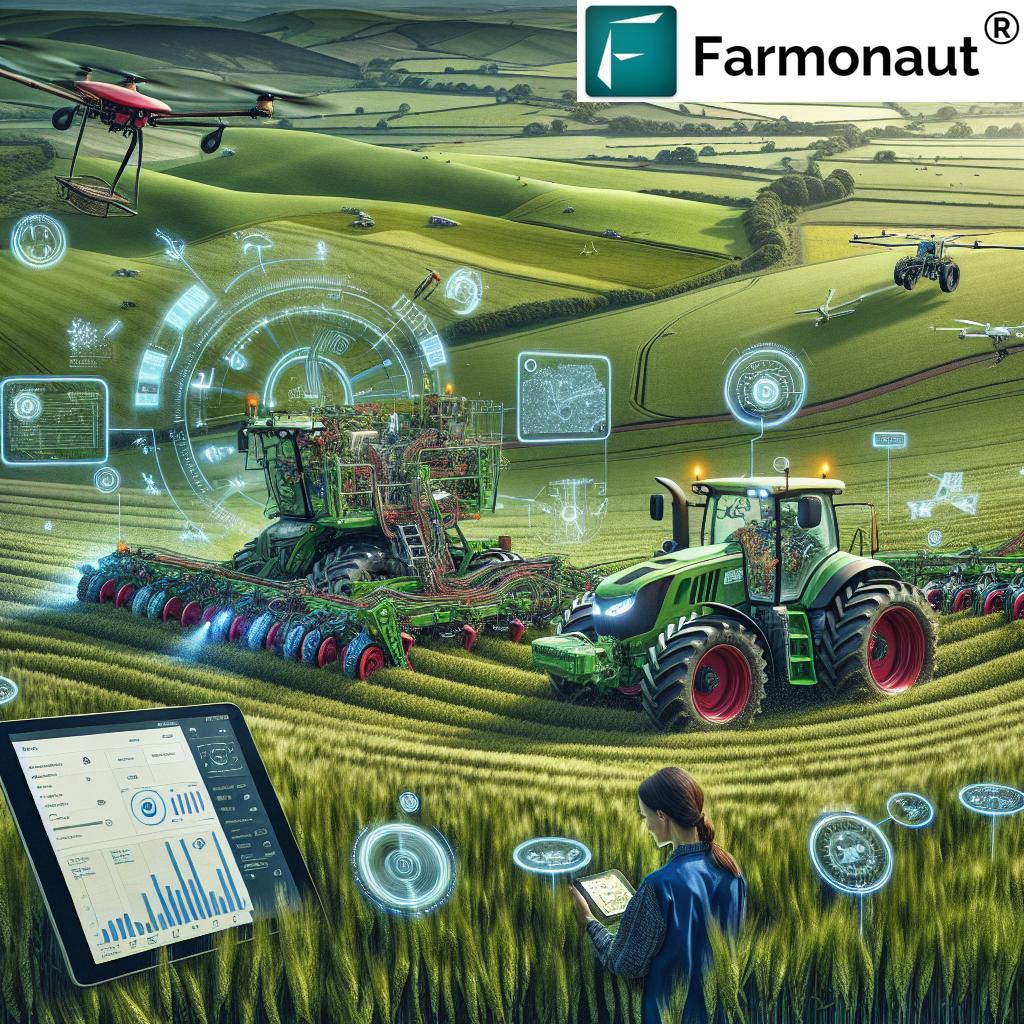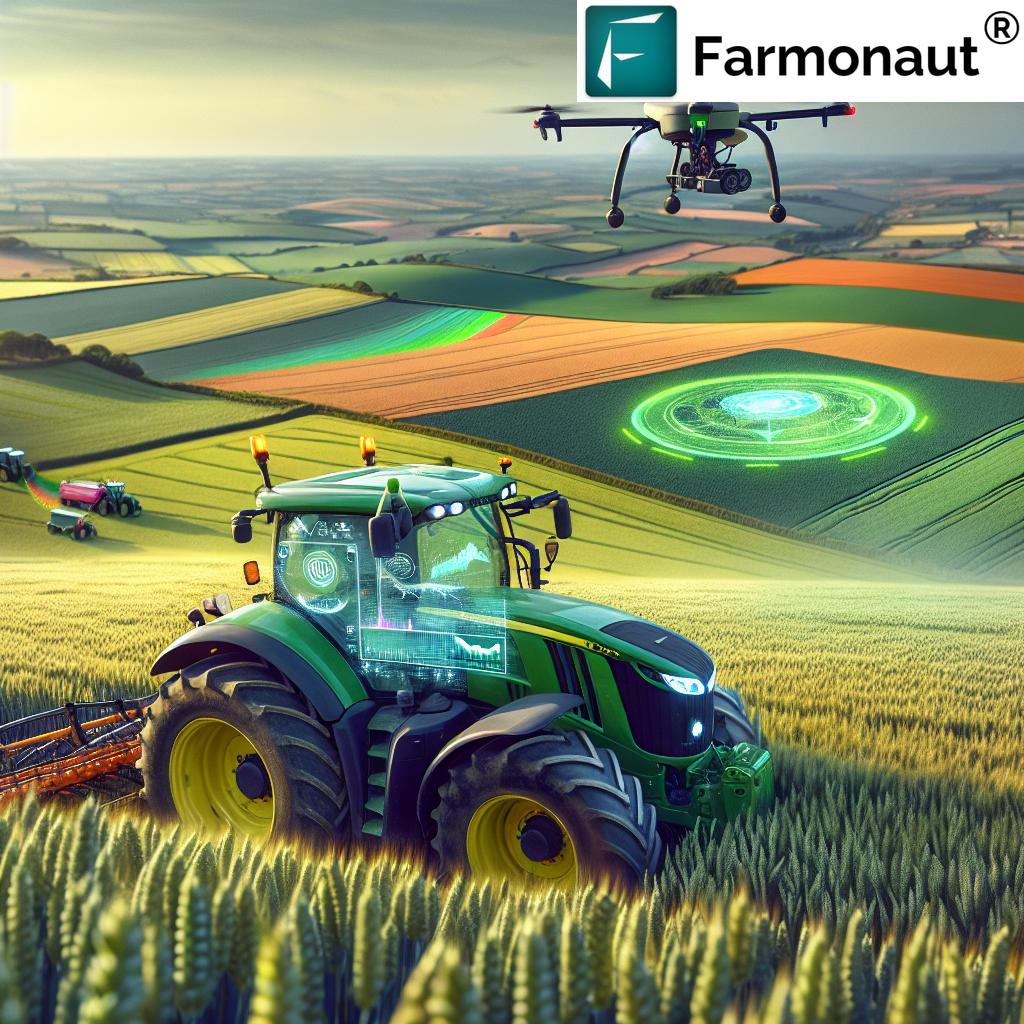Revolutionizing Scottish Sheep Farming: Sustainable Practices and AgriTech Solutions for Upland Areas
“Scottish sheep farming’s 24-point action plan aims to revitalize the industry and promote sustainable practices.”
Welcome to our comprehensive exploration of the evolving landscape of sustainable sheep farming in Scotland. In this blog post, we’ll delve into the innovative agritech solutions and smart farming practices that are reshaping the UK’s agricultural sector, with a particular focus on the Scottish sheep industry. As we navigate through the latest trends, technological advancements, and environmental considerations, we’ll uncover how upland farming practices are contributing to both conservation efforts and cultural preservation while maintaining economic viability.
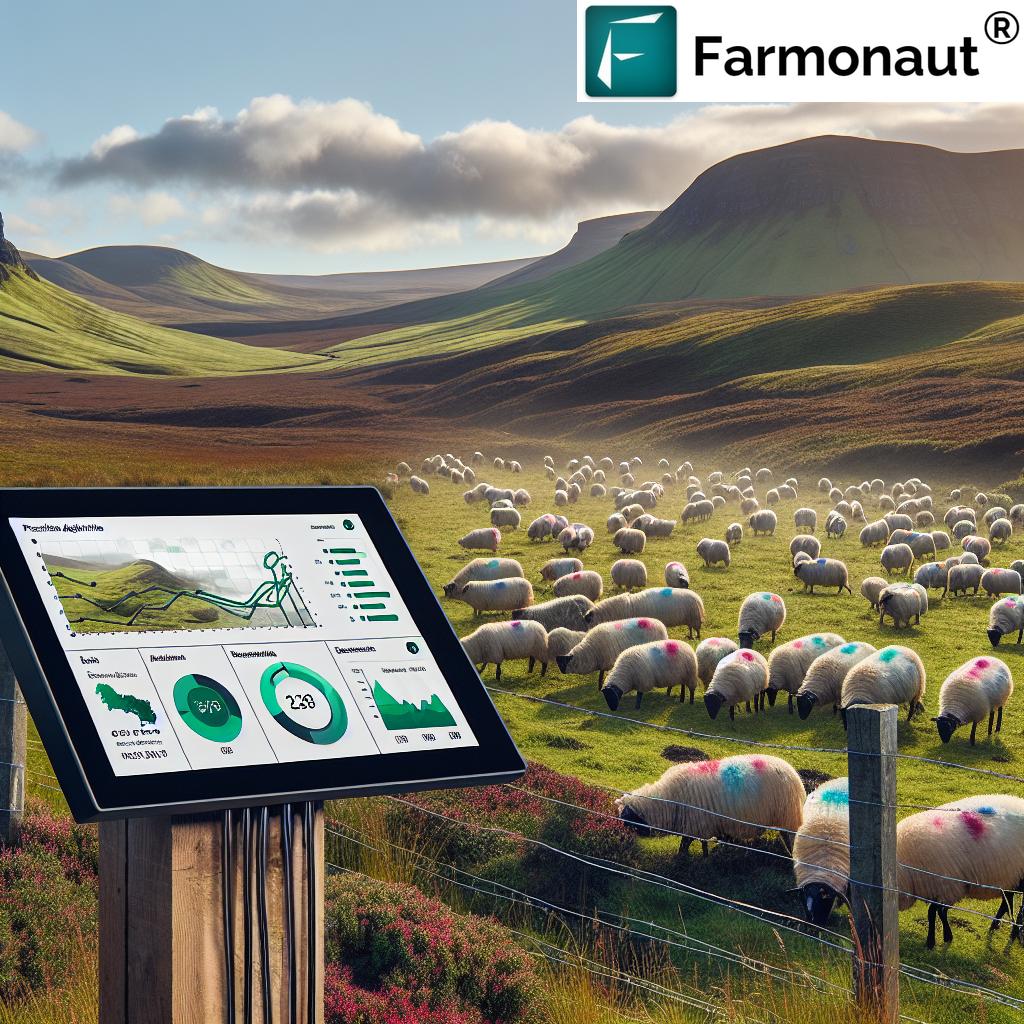
The Changing Face of Scottish Sheep Farming
Scottish sheep farming has long been a cornerstone of the UK’s agricultural landscape, particularly in upland and hill areas. However, the sector faces numerous challenges, from environmental pressures to economic uncertainties. In response, the industry has developed a 24-point action plan aimed at revitalizing and future-proofing sheep farming in Scotland. This plan encompasses a range of initiatives, from improving animal health and welfare to embracing cutting-edge technology.
- Sustainable land management practices
- Enhanced animal health protocols
- Integration of precision agriculture techniques
- Promotion of Scottish lamb in international markets
- Development of rural skills and knowledge transfer
At Farmonaut, we recognize the importance of these initiatives and are committed to supporting farmers with our advanced satellite-based farm management solutions. Our platform provides valuable tools for real-time crop health monitoring, AI-based advisory systems, and resource management, all of which can be applied to optimize sheep farming operations.
Upland Farming Practices: Balancing Conservation and Production
Upland areas play a crucial role in Scottish sheep farming, offering vast grazing lands that have shaped the country’s landscape for centuries. These areas present unique challenges and opportunities for sustainable farming practices:
- Biodiversity conservation: Upland sheep farming can contribute to maintaining diverse ecosystems when managed properly.
- Carbon sequestration: Well-managed grasslands in upland areas can act as significant carbon sinks.
- Cultural heritage: Traditional farming methods in these areas preserve Scotland’s rich agricultural heritage.
- Sustainable grazing: Implementing rotational grazing systems to prevent overgrazing and promote grassland health.
To support these efforts, Farmonaut’s satellite-based crop health monitoring can be adapted to assess grassland conditions in upland areas, helping farmers make informed decisions about grazing patterns and land management.
AgriTech Solutions Transforming Sheep Farming
The integration of agricultural technology is revolutionizing sheep farming practices across Scotland. These innovations are enhancing productivity, improving animal welfare, and contributing to more sustainable operations:
- Electronic Identification (EID) in Livestock: EID systems are transforming flock management, allowing for precise tracking of individual animals’ health, productivity, and lineage.
- Precision Agriculture for Pasture Management: Satellite imagery and drones are being used to assess pasture quality and optimize grazing strategies.
- Smart Sensors and IoT Devices: These technologies monitor animal health, detect lameness, and alert farmers to potential issues in real-time.
- Data Analytics and AI: Advanced algorithms process farm data to provide insights on breeding, nutrition, and disease prevention.
Farmonaut’s platform complements these advancements by offering farmers access to satellite imagery and AI-driven insights that can be applied to sheep farming operations. Our Jeevn AI Advisory System, for instance, can be tailored to provide personalized recommendations for pasture management and flock health.
Explore Farmonaut’s API for custom agritech solutions
Animal Health Initiatives in Scottish Sheep Farming
Maintaining the health of sheep flocks is paramount for sustainable and profitable farming. Several key initiatives are currently shaping animal health management in Scotland:
- Scrapie Surveillance Program: This ongoing initiative aims to monitor and control the spread of scrapie, a fatal neurodegenerative disease in sheep.
- SCOPS Nematodirus Warning System: The Sustainable Control of Parasites in Sheep (SCOPS) group provides forecasts and advice to help farmers manage the risk of Nematodirus infections.
- Sheep Scab Control Programs: Collaborative efforts between farmers, veterinarians, and government agencies to reduce the incidence of sheep scab.
- Lameness Reduction Strategies: Implementation of the Five-Point Plan to control lameness in sheep flocks.
While Farmonaut’s primary focus is on crop monitoring and management, our technology can indirectly support animal health initiatives by helping farmers maintain healthy pastures and optimize land use for sheep grazing.
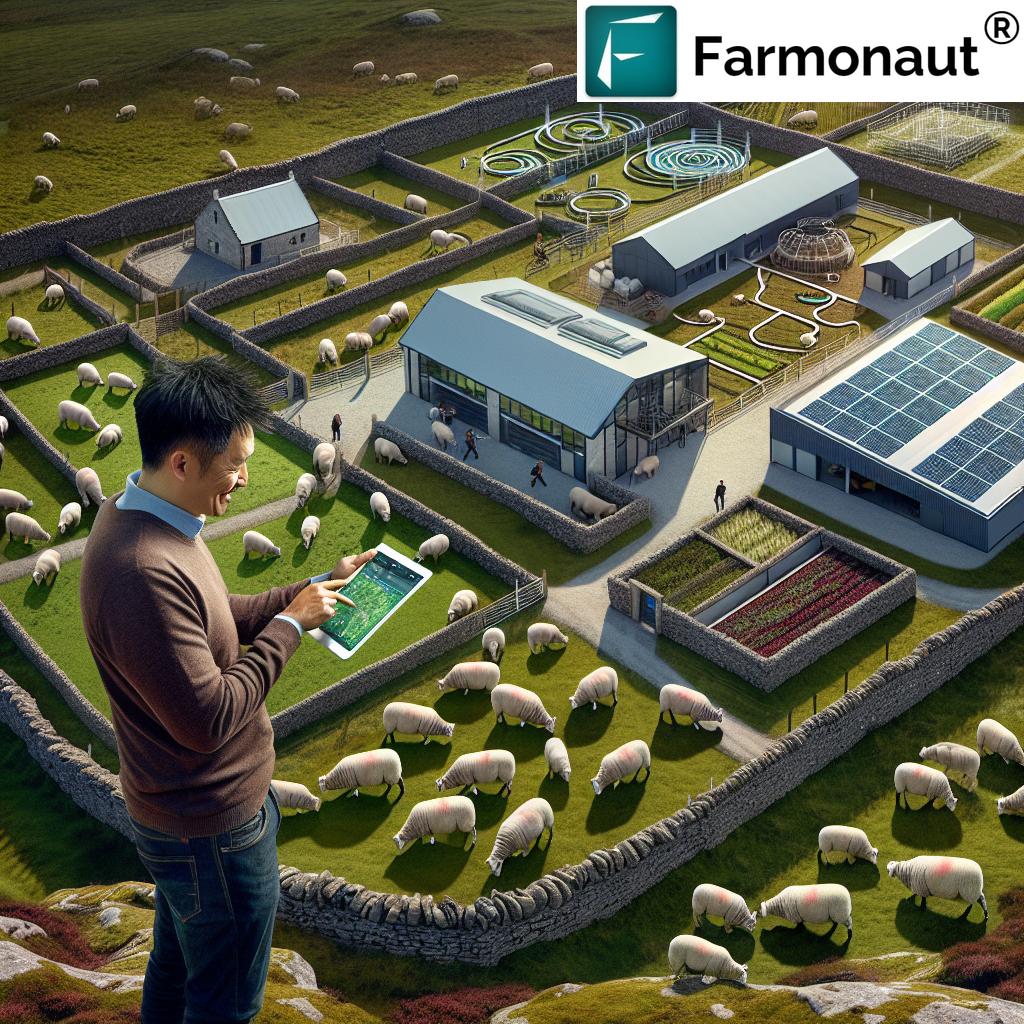
Welfare Regulations and Industry Standards
The welfare of sheep is a top priority for Scottish farmers and regulators alike. Recent developments in this area include:
- EFSA Open Consultations: The European Food Safety Authority (EFSA) is currently conducting open consultations on the risks associated with sheep farming practices, aiming to improve welfare standards across the EU.
- Farm Assurance Schemes: Programs like Quality Meat Scotland (QMS) set high standards for animal welfare and sustainable farming practices.
- Transport Regulations: Stricter rules on the transportation of live animals to ensure their well-being during transit.
- Pain Management Protocols: Implementation of best practices for pain relief during routine procedures like tail docking and castration.
At Farmonaut, we believe that sustainable farming goes hand in hand with animal welfare. Our precision agriculture solutions can help farmers create optimal environments for their flocks, indirectly supporting welfare objectives.
Access Farmonaut’s API Developer Docs for integrating agritech solutions
Global Market Projections for Scottish Lamb
The Scottish sheep sector is not just focused on domestic markets; it’s increasingly looking towards international opportunities. Here’s an overview of the global market projections for Scottish lamb:
- Export Growth: Efforts to increase exports of high-quality Scottish lamb to markets in Europe, North America, and Asia.
- Protected Geographical Indication (PGI): Leveraging the PGI status of Scotch Lamb to differentiate the product in international markets.
- Sustainability Credentials: Using Scotland’s reputation for natural, sustainable farming practices as a selling point in environmentally conscious markets.
- Value-Added Products: Development of processed and ready-to-eat lamb products to cater to changing consumer preferences globally.
Farmonaut’s blockchain-based traceability solutions can play a crucial role in enhancing the transparency and credibility of Scottish lamb in international markets, providing assurance to consumers about the product’s origin and production methods.
“The UK sheep sector utilizes electronic identification (EID) for improved livestock traceability and management efficiency.”
Environmental Conservation Through Smart Farming
Smart farming practices are playing an increasingly important role in environmental conservation within the Scottish sheep sector. These practices not only benefit the environment but also contribute to the long-term sustainability of farming operations:
- Precision Grazing Management: Using GPS and satellite data to optimize grazing patterns and prevent overgrazing.
- Carbon Footprint Reduction: Implementing strategies to minimize methane emissions from sheep and improve carbon sequestration in pastures.
- Water Management: Utilizing smart irrigation systems and rainwater harvesting to conserve water resources.
- Biodiversity Enhancement: Creating and maintaining habitats for wildlife alongside sheep farming activities.
Farmonaut’s satellite-based crop health monitoring and AI advisory systems can be adapted to support these conservation efforts by providing farmers with detailed insights into their land use and resource management practices.
The Role of Technology in Enhancing Traceability
Traceability is becoming increasingly important in the sheep farming industry, both for regulatory compliance and consumer trust. Electronic Identification (EID) systems are at the forefront of this technological revolution:
- Individual Animal Tracking: EID tags allow for precise tracking of each animal’s movements and health history.
- Supply Chain Transparency: From farm to fork, EID systems enable complete traceability of lamb products.
- Disease Control: Rapid identification and isolation of affected animals in case of disease outbreaks.
- Performance Monitoring: Detailed records of individual animal performance for breeding and management decisions.
Farmonaut’s blockchain-based traceability solutions can complement EID systems by providing an immutable record of farm-level data, further enhancing transparency and trust in the supply chain.
Precision Agriculture Solutions for Sheep Farming
Precision agriculture, traditionally associated with arable farming, is now making significant inroads into the sheep sector. These solutions offer numerous benefits for sheep farmers:
- Satellite-Based Pasture Monitoring: Regular assessment of pasture quality and quantity to optimize grazing schedules.
- Soil Health Analysis: Detailed soil mapping to guide fertilization and pasture improvement strategies.
- Weather Forecasting: Accurate local weather predictions to inform management decisions, particularly during lambing season.
- Flock Management Software: Integrated platforms that combine EID data with farm management tools for comprehensive decision-making.
Farmonaut’s precision agriculture platform offers many of these capabilities, providing sheep farmers with valuable insights to enhance their operations. Our satellite-based crop health monitoring can be easily adapted to assess pasture conditions, while our AI advisory system can provide tailored recommendations for sheep farming practices.
Sustainable Practices in Scottish Sheep Farming: A Comparative Analysis
| Practice | Environmental Impact | Economic Viability | Animal Welfare | Technological Integration |
|---|---|---|---|---|
| Upland Conservation | Preserves biodiversity and landscapes (4/5) | Supports rural economies (3/5) | Provides natural grazing habitats (4/5) | Utilizes satellite monitoring (3/5) |
| Smart Farming Techniques | Reduces resource waste (4/5) | Improves efficiency and profitability (5/5) | Enhances individual animal care (4/5) | Incorporates IoT and AI solutions (5/5) |
| Electronic Identification (EID) | Minimizes paperwork and waste (3/5) | Streamlines management processes (4/5) | Enables precise health tracking (5/5) | Central to modern flock management (5/5) |
| Health Initiatives | Reduces medication use (3/5) | Decreases losses from disease (4/5) | Significantly improves flock health (5/5) | Integrates with data analysis tools (4/5) |
| Precision Agriculture Solutions | Optimizes resource use (5/5) | Maximizes yield and quality (5/5) | Improves pasture management for better nutrition (4/5) | Leverages cutting-edge agritech (5/5) |
The Future of Scottish Sheep Farming
As we look to the future, the Scottish sheep sector is poised for significant transformation. The integration of sustainable practices, agritech solutions, and a focus on animal welfare and environmental conservation will shape the industry in the coming years. Key trends to watch include:
- Increased Adoption of Precision Agriculture: More farmers will leverage data-driven insights to optimize their operations.
- Emphasis on Carbon-Neutral Farming: Efforts to reduce the carbon footprint of sheep farming through innovative practices and technologies.
- Diversification of Farm Income: Exploring agritourism and value-added products to supplement traditional farming income.
- Continued Focus on Genetic Improvement: Using advanced breeding techniques to develop more resilient and productive sheep breeds.
Farmonaut is committed to supporting this evolution by continually enhancing our platform to meet the specific needs of sheep farmers. Our goal is to make precision agriculture accessible and affordable, helping farmers navigate the challenges and opportunities that lie ahead.
Conclusion: Embracing Innovation for a Sustainable Future
The Scottish sheep farming sector stands at a crucial juncture, balancing traditional practices with innovative technologies to ensure a sustainable and prosperous future. By embracing agritech solutions, implementing smart farming techniques, and prioritizing animal welfare and environmental conservation, the industry is well-positioned to overcome challenges and seize new opportunities.
As we’ve explored in this blog post, the integration of precision agriculture, electronic identification systems, and data-driven decision-making tools is revolutionizing sheep farming in upland areas. These advancements not only enhance productivity and profitability but also contribute to the preservation of Scotland’s unique landscapes and cultural heritage.
At Farmonaut, we’re proud to be part of this agricultural revolution, offering cutting-edge satellite-based farm management solutions that support sustainable farming practices. Our platform’s versatility allows it to be adapted for various aspects of sheep farming, from pasture management to supply chain traceability.
As the industry continues to evolve, collaboration between farmers, technology providers, researchers, and policymakers will be key to driving innovation and ensuring the long-term viability of Scottish sheep farming. By working together and leveraging the power of agritech, we can create a more resilient, efficient, and sustainable sheep farming sector that benefits farmers, consumers, and the environment alike.
FAQ Section
Q: How is precision agriculture benefiting sheep farming in Scotland?
A: Precision agriculture is revolutionizing sheep farming by providing data-driven insights for pasture management, flock health monitoring, and resource optimization. Technologies like satellite imagery and IoT sensors help farmers make informed decisions, leading to improved productivity and sustainability.
Q: What role does electronic identification (EID) play in modern sheep farming?
A: EID systems are crucial for individual animal tracking, enabling precise management of flock health, breeding programs, and supply chain traceability. This technology enhances efficiency, supports disease control efforts, and meets regulatory requirements for livestock management.
Q: How are upland sheep farming practices contributing to environmental conservation?
A: Sustainable upland sheep farming practices help maintain biodiversity, preserve traditional landscapes, and contribute to carbon sequestration. Proper grazing management can prevent soil erosion and support the health of unique upland ecosystems.
Q: What are the main challenges facing Scottish sheep farmers today?
A: Scottish sheep farmers face challenges including market volatility, climate change impacts, disease management, and maintaining profitability in remote areas. Adapting to new technologies and meeting evolving consumer demands for sustainable and traceable products are also key challenges.
Q: How can Farmonaut’s technology be applied to sheep farming?
A: While Farmonaut’s primary focus is on crop monitoring, our satellite-based technology can be adapted for pasture management in sheep farming. Our platform can help assess grazing land health, optimize resource use, and provide valuable insights for sustainable farm management practices.






